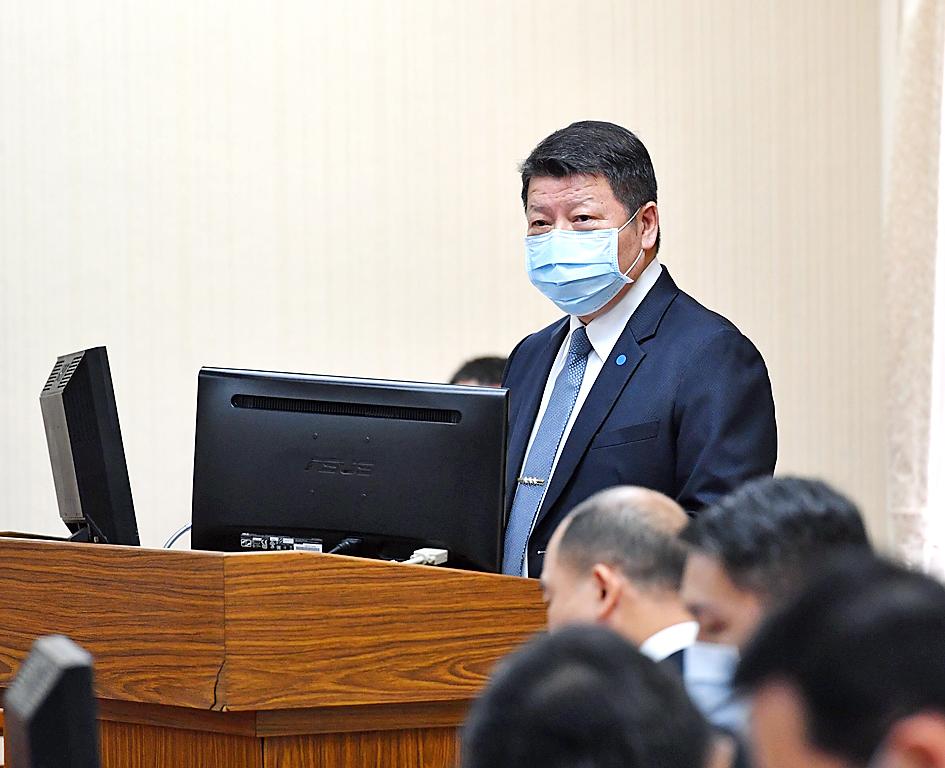The Ministry of National Defense (MND) yesterday confirmed media reports that it plans to purchase coastal defense cruise missile (CDCM) systems from the US, saying that they could be delivered by 2023, should Washington agree to sell.
At a meeting of the Legislative Yuan’s Foreign Affairs and National Defense Committee, Democratic Progressive Party (DPP) Legislator Tsai Shih-ying (蔡適應) asked the ministry to respond to rumors about plans to purchase CDCMs, a truck-mounted system of Harpoon anti-ship missiles made by Boeing Defense, Space & Security for mobile coastal defense.
Deputy Minister of National Defense Chang Che-ping (張哲平) said that the ministry and the Chungshan Institute of Science and Technology (CSIST) had reviewed national missile production capabilities through 2025.

Photo: CNA
The review found that the nation is incapable of fielding sufficient missiles to annihilate 50 percent of enemy forces on Taiwanese shores in the event of a Chinese invasion, Chang said.
Taiwan has operated indigenous Hsiung Feng II subsonic anti-ship missile systems since 1988 and its supersonic variant, the Hsiung Feng III, since 2007.
After Tsai asked about annual production of the locally made missile systems, Chang said that he would have to verify the numbers.
Harpoon missiles are similar to the Taiwanese weapons, although the Hsiung Feng II has greater range and a faster cruising speed, CSIST president Art Chang (張忠誠) said, adding that the truck-borne Harpoons allow for comparatively greater mobility than the Hsiung Feng II, which needs to be towed.
Meanwhile, Chang Che-ping said that the ministry was not aware of Minister of Foreign Affairs Joseph Wu’s (吳釗燮) comments about potential Chinese People’s Liberation Army actions against Taiwan.
In a video interview with Fox News anchor Martha MacCallum on Tuesday, Wu said that Taiwan and the global community are watching Beijing’s actions in Hong Kong closely.
Asked if it were possible that China might deploy its military against Taiwan or in Hong Kong, Wu said that the Chinese government is trying to fully take over the administration in Hong Kong.
There is “also concern that China might take some military action against Taiwan,” he said. “That’s what I said all along: When the Chinese government is facing crisis domestically, the best way for it is to find a scapegoat outside, and Taiwan can be a very easy scapegoat for China.”
Some reports mistakenly reported Wu as saying that China’s next step would be to take Taiwan by force, Ministry of Foreign Affairs spokeswoman Joanne Ou (歐江安) said yesterday.
Chang Che-ping told the committee that the military had contingency plans in place and was closely monitoring the Taiwan Strait, but it would not “make a blind move” based on a single comment.
Military readiness levels remain normal and adjustments would depend on developments in Hong Kong, which the military is closely monitoring, he said.
The MND has contingency plans in place for any Chinese invasion scenario, he said.

BUILDUP: US General Dan Caine said Chinese military maneuvers are not routine exercises, but instead are ‘rehearsals for a forced unification’ with Taiwan China poses an increasingly aggressive threat to the US and deterring Beijing is the Pentagon’s top regional priority amid its rapid military buildup and invasion drills near Taiwan, US Secretary of Defense Pete Hegseth said on Tuesday. “Our pacing threat is communist China,” Hegseth told the US House of Representatives Appropriations Subcommittee on Defense during an oversight hearing with US General Dan Caine, chairman of the Joint Chiefs of Staff. “Beijing is preparing for war in the Indo-Pacific as part of its broader strategy to dominate that region and then the world,” Hegseth said, adding that if it succeeds, it could derail

CHIP WAR: The new restrictions are expected to cut off China’s access to Taiwan’s technologies, materials and equipment essential to building AI semiconductors Taiwan has blacklisted Huawei Technologies Co (華為) and Semiconductor Manufacturing International Corp (SMIC, 中芯), dealing another major blow to the two companies spearheading China’s efforts to develop cutting-edge artificial intelligence (AI) chip technologies. The Ministry of Economic Affairs’ International Trade Administration has included Huawei, SMIC and several of their subsidiaries in an update of its so-called strategic high-tech commodities entity list, the latest version on its Web site showed on Saturday. It did not publicly announce the change. Other entities on the list include organizations such as the Taliban and al-Qaeda, as well as companies in China, Iran and elsewhere. Local companies need

CROSS-STRAIT: The MAC said it barred the Chinese officials from attending an event, because they failed to provide guarantees that Taiwan would be treated with respect The Mainland Affairs Council (MAC) on Friday night defended its decision to bar Chinese officials and tourism representatives from attending a tourism event in Taipei next month, citing the unsafe conditions for Taiwanese in China. The Taipei International Summer Travel Expo, organized by the Taiwan Tourism Exchange Association, is to run from July 18 to 21. China’s Taiwan Affairs Office spokeswoman Zhu Fenglian (朱鳳蓮) on Friday said that representatives from China’s travel industry were excluded from the expo. The Democratic Progressive Party government is obstructing cross-strait tourism exchange in a vain attempt to ignore the mainstream support for peaceful development

CRITICISM: It is generally accepted that the Straits Forum is a CCP ‘united front’ platform, and anyone attending should maintain Taiwan’s dignity, the council said The Mainland Affairs Council (MAC) yesterday said it deeply regrets that former president Ma Ying-jeou (馬英九) echoed the Chinese Communist Party’s (CCP) “one China” principle and “united front” tactics by telling the Straits Forum that Taiwanese yearn for both sides of the Taiwan Strait to move toward “peace” and “integration.” The 17th annual Straits Forum yesterday opened in Xiamen, China, and while the Chinese Nationalist Party’s (KMT) local government heads were absent for the first time in 17 years, Ma attended the forum as “former KMT chairperson” and met with Chinese People’s Political Consultative Conference Chairman Wang Huning (王滬寧). Wang